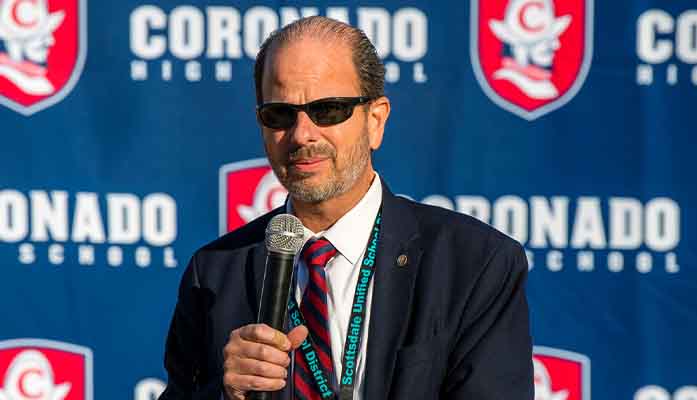
by Tamra Farah | Jun 11, 2024 | Opinion
By Tamra Farah |
The Peoria Unified School District (PUSD) is seeking federal funds to renew the Mental Health Service Professionals (MHSP) Demonstration Grant through the Department of Education (ED). The grant would enable the district to expand its program for unlicensed behavioral health workers. The grant application includes assertions to garner sympathy and support, such as highlighting low student-to-behavioral health worker ratios, funding cuts, and increased student academic issues post-COVID. There is just one problem: the initiative is flawed and poorly justified when scrutinized, raising several critical concerns.
If renewed, the MHSP grant would enable PUSD to hire additional counselors and social workers, asserting that they will assist students deemed to have mental health issues that purportedly hinder academic performance. A primary concern is the qualification of these personnel and the poor track record in this type of intervention in improving academic proficiency.
In a recent Substack piece, Attorney Chris Evans points out that the district refers to the personnel to be hired as “mental health professionals,” which Evans argues is “a title inflation for a person with no license from a professional board, no regulatory oversight, but is certified by the Arizona Department of Education to work in schools with zero scope of practice limitations.” This raises grave concerns about the effectiveness of mental health assistance and the safety of children under the care of these individuals.
PUSD staff and board members persist in claiming that behavioral health services enhance academic outcomes. However, the evidence to support this assertion is lacking. Robust independent research indicates this claim is false and seems to justify seeking federal funds rather than being a fact-based strategy.
For example, a close examination of PUSD academic assessments from 2017-2018 to 2023 reveals minimal improvement over five years in attempting to integrate behavioral health services into its schools; the expected improvements in academic performance have not materialized. During the first grant period, state assessment scores show no significant progress, and in subjects like math, the scores have declined. This stagnation indicates the lack of effectiveness of the rationale for the project’s federal funding and suggests that the behavioral health program has not delivered the promised academic benefits. If these programs cannot demonstrate a clear, positive impact on student achievement, their expansion, and current presence in schools are suspicious.
The ideological motivations behind this push for more behavioral health services cannot be ignored. The emphasis on social justice and equity indicated in the grant application may overshadow the primary goal of educational institutions: to enhance academic achievement. The current approach appears to conflate these objectives, potentially at the expense of educational quality.
The current justification for renewing this grant employed by PUSD is misguided. At the May 29 meeting, board President Becky Proudfit asked the grant administrator if the first grant initiated in 2019 had been effective and what the effect had been on the students in the district. During his response, the administrator admitted that he thinks, “It’s just really important to note that it’s hard to determine the overall success of the grant.” And still, the PUSD board voted 4-1 to renew the Mental Health Service Professionals (MHSP) Demonstration Grant for another five years.
It is time for PUSD to reevaluate its priorities and ensure that any funded programs are accountable and effective. Most importantly, addressing mental health in students is important, yet fundamentally within the authority and responsibility of parents and guardians, not schools.
Tamra Farah has a twenty-year career in public policy and politics. Her role as director and senior advisor at Americans for Prosperity, FreedomWorks, and Arizona Women of Action and her expertise in PR and communications demonstrates her ability to create engagement and transformation in her efforts. Tamra has appeared on Fox News, America’s Voice, Newsmax, and Victory Channel and is quoted in major publications like The New York Times and Washington Post.

by Tamra Farah | May 25, 2024 | Opinion
By Tamra Farah |
Progressive educators have dressed up nonacademic social training in different outfits for decades. Still, the goal remains: to use public education to dictate the next generation’s norms and behaviors. This may seem innocent enough, but it’s not.
Early 20th-century education reformers like Edward Thorndike of Columbia Teachers College and John Dewey, the father of American progressive education, set out to refashion public education to diminish individuality and family influence in children. They aimed to replace these influences with a collectivist mindset prepared for the workforce. By doing so, they could capture the minds and hearts of children in the classroom and substitute “the state for the home and faith.”
Their socialist behaviorist model was effectively the first version of what we now know as social-emotional learning (SEL), which was most recently repackaged as the Whole Child educational framework.
But I’m getting ahead of myself.
In the 1960s, Dr. James Comer of the Yale School of Medicine’s Child Study Center set out to prove the effectiveness of behavior versus academic focus for student success. He tested his theory in 650 low-income schools, admitting thirty years later that it was a failure. Still, his method served as the foundation for today’s SEL in schools.
In the 1980s, Psychology Professor Roger Weissberg aimed to help students “develop positive self-concepts” and hone skills in “self-monitoring” and “values such as personal responsibility and respect for self and others.” These seem like loaded phrases subject to interpretation, but his approach was acceptable enough to keep the behaviorist model train running on its tracks.
By the 1990s, National Center for Education and the Economy (NCEE) president Marc Tucker helped pass the Goals 2000 Educate America Act during the Clinton administration, echoing Thorndike’s goals to advance a socialist workforce development mindset in K-12 education. This was followed by the controversial Outcomes Based Education (OBE) model, which debuted when my kids were school age.
Thankfully, parental backlash in the 1990s squashed OBE, yet it morphed and reappeared through CASEL, the Collaborative to Advance Social and Emotional Learning. CASEL took time to stake its claim by hosting conferences and sponsoring research, presumably to build a support base. CASEL’s champion, Dr. Linda Darling-Hammond of Stanford Graduate School of Education, was a known progressive who advocated for educational equity. The push for so-called equity, versus the much-respected American concept of equal opportunity, hit schools long before COVID.
CASEL’s goals for students include providing “the process through which children and adults understand and manage emotions, set and achieve positive goals, feel and show empathy for others, establish and maintain positive relationships, and make responsible decisions.” This sounds innocuous until you realize their specific definitions for each element may be a far cry from what you might think.
For example, CASEL definitively overplays the role of schools in a child’s life when it asserts that “schools have an important role to play in raising healthy children by fostering not only their cognitive development but also their social and emotional development.” (Emphasis is mine.) This is a tremendous assumption of power over your children in the classroom and is tantamount to brainwashing, not promoting basic good behavior.
CASEL defends its emphasis on social and emotional learning via research that leaves something to be desired. First, there are no recent U.S.-based studies; instead, they cite a 2006 study that asked a national sample of 148,189 sixth through twelfth-grade students if they thought they had social competencies such as empathy, decision-making, and conflict-resolution skills. The results? Only 29% indicated that their school provided a caring, encouraging environment. And how accurate are the results when parents were not consulted on the answers, given the relative immaturity of kids to answer these questions competently?
The latest version of SEL, dubbed Whole Child, stems from The Chan Zuckerberg Initiative. It includes expansive elements in its list of critical areas for schools to deliver to students: mental health, cognitive development, social-emotional development, identity development, academic development, and physical health. This resembles a giant leap toward Thorndike and Dewey’s early progressive education agenda.
According to research from the Massachusetts-based think tank Pioneer, Thorndike equated “learning with training” and believed in learning by conditioning. Like Pavlov’s dogs, children could be conditioned to exhibit the desired behaviors by a system of positive or negative consequences linked to actions. John Dewey, the dean of American progressive education, was equally enthusiastic about manipulating the psychological aspects of learning to manipulate the child.
Remember, Dewey favored the “educational potential of social behaviorism used in totalitarian societies” since those societies “required a collective and cooperative mentality.”
Pioneer’s conclusion? “Carried to its logical conclusion, SEL can replace parental influence with the ultimate nanny state.” Progressives have dressed up the nonacademic paradigm of social-emotional style learning in different outfits for decades. They have planned to substitute “the state for the home and faith” and replace individual liberty with a collectivist mindset readied for the “workforce.”
Social Emotional Learning, in its “transformative” form, promotes “justice-oriented civic engagement” to make your kids into activists or “social justice warriors.” Black Lives Matter has often invited schools over the last few years to engage in that process.
A hallmark of SEL’s manipulative approach is the use of student surveys. The surveys are sent to kids’ email inboxes, often asking questions of students that require parental consent according to federal law. SEL puts teachers in a mindset to pry into the lives of students and families. Indiana Attorney General Todd Rokita said social and emotional learning programs shift “the role of teachers from educators to therapists.”
SEL is also big business. According to Education Week, nationwide sales of social and emotional learning materials shot up 45% in a year and a half to $765 million in 2021. Soon after, Attorney General Merrick Garland asked the FBI to investigate parents protesting social and emotional learning issues at SB meetings. It just so happens that Garland’s son-in-law co-founded Panorama Education, a company raking in millions selling social and emotional learning materials to school districts.
Don’t be fooled by social-emotional learning as your child’s education framework. It is not founded on academics and pushes your kids toward an activist mindset that may not align with your family’s values. The Scottsdale Unified School District’s governing board recently approved a new social-emotional learning curriculum called Second Step. For help discovering SEL’s impact on your kids at school, contact education@azwomenofaction.com for information and steps you can take.
Tamra Farah has a twenty-year career in public policy and politics. Her role as director and senior advisor at Americans for Prosperity, FreedomWorks, and Arizona Women of Action and her expertise in PR and communications demonstrate her ability to create engagement and transformation in her efforts. Tamra has appeared on Fox News, America’s Voice, Newsmax, and Victory Channel and quoted in major publications like The New York Times and Washington Post.

by Tamra Farah | May 1, 2024 | Opinion
By Tamra Farah |
The community school model establishes school-based health clinics and is championed by entities such as the National Education Association, the American Federation of Teachers, big pharma, and Community-Based Organizations. This model is rapidly being implemented nationwide, leaving no state untouched. It increases governmental and powerful non-government organization (NGOs) control in K-12 public schools while driving a wedge between parents and children.
Concerns surrounding school-based health clinics include adopting models like the Whole School, Whole Community, and Whole Child (WSCC). These “community schools” serve as conduits for expanding governmental control over children. Of particular concern are issues related to parental consent and notification rights, especially concerning Medicaid billing and medical procedures carried out without parental knowledge or presence.
A Kentucky mom recently told her story on social media after her child saw a school dentist without her consent. The school authorized her daughter to receive anesthesia for a procedure the mother never agreed to. The family dentist later stated that her teeth were healthy and did not need the school’s dental care. That’s bad enough, but these government-run school-based health clinics are far more invasive than this.
This sounds eerily like a socialist healthcare agenda, particularly the Whole Child-Whole Community model advocated by the Centers for Disease Control (CDC). This model not only undermines parental authority but introduces socialized healthcare into schools. Concerns include the potential for these programs to expand Medicaid coverage under the pretext of health equity.
School-based health clinics are backed by federal grants and championed by government organizations like the CDC. They aim to offer comprehensive primary health services directly within school campuses, encompassing physical and mental health care. The allocation of federal grants, such as the $50 million earmarked for school-based health services, and philanthropic investments of $23 million from entities like Melinda Gates’ company and Mackenzie Scott into organizations like the School-Based Health Alliance fuel apprehensions about these programs’ growing influence.
Funding for full-service Community Schools in the 2025 U.S. Budget has intensified these concerns. Such initiatives can deepen the medicalization of K-12 education and extend Medicaid coverage under the guise of health equity, potentially entangling the government further in family affairs. Recent developments include Biden’s expansion of Obamacare and the integration of mental health services into schools. Might this include a surveillance system akin to China’s social credit system?
Meanwhile, the partnership between schools and HRSA-supported health centers seeks to enhance access to comprehensive primary healthcare services for students and communities. These collaborations assert that they exist to promote health equity for families without healthcare. Yet, recent national survey data show that the uninsured rate among children (ages 0-17) fell from 6.4 percent in late 2020 to 4.5 percent in the third quarter of 2022. In addition, it appears to justify significant government spending by pulling on heartstrings.
In Arizona, efforts to address students’ mental health needs directly on school campuses are underway through partnerships with organizations like Touchstone Health Services and Valle Del Sol. These services, also funded through tax dollars, cover a spectrum of mental health concerns, from anxiety and depression to social isolation and stress. In rural communities like Graham County, telehealth options like Dialogue by DialCare have been deployed to overcome shortages of mental health professionals, granting students access to licensed counselors through virtual or telephonic counseling sessions. These developments raise the red flag of school-based counselors engaging in conversations or therapy with students without parental knowledge or consent.
Then there are school-linked services, facilitated by school nurses and School-Based Health Centers (SBHCs), which aim to improve student and family access to health and human services by providing comprehensive, accessible, and coordinated care on and off school grounds. Again, these initiatives are touted as prioritizing students’ health and well-being. That sounds like the role of parents, not schools.
Arizona Women of Action is very concerned about the impact of Community Schools on families and education. These schools prioritize health-related issues over the traditional primary focus on academics in education. We encourage the ADE to reassess contracts with Medicaid and Public Consulting Group, considering the troubling implications of their equity-based approach.
In response to the growing presence of School-Based Health Clinics meddling in family affairs, one vigilant mother from X has issued a cautionary message and actionable steps for parents to take. She advises parents to request a comprehensive list of all personnel, including representatives from Community-Based Organizations (CBOs), who have access to students on school campuses and to actively engage in posing questions to school officials to monitor the funding sources entering their children’s schools closely.
Schools do not exist to function as health clinics, and parents should scrutinize the details of any forms or school registration documents, ensuring they understand the implications of granting access to various personnel and services regarding their child.
Tamra Farah has twenty years of experience in public policy and politics, focusing on protecting individual liberty and promoting limited government. She’s served at the director level at Americans for Prosperity-Colorado, FreedomWorks, and currently with Arizona Women of Action.

by Tamra Farah | Apr 27, 2024 | Opinion
By Tamra Farah and Jill Dunican |
In the corridors of education, a seismic shift is underway. Local superintendents, entrusted with shaping the educational landscape, are being influenced by a woke agenda that transcends their official roles. Behind this phenomenon lies the shadowy hand of leftist interests, channeled through national and state chapters of the School Superintendent Association (AASA), driving an agenda that reaches deep into the heart of public education.
Recent events in El Paso County, Colorado, underscore the extent of this influence. Allegations have surfaced of a superintendent employing intimidation tactics, supported by legal counsel, to suppress reports of a sexualized gender focus in classrooms. Such incidents reveal a troubling trend of silencing dissent and stifling transparency in the pursuit of ideological conformity.
At the national level, the AASA is actively seeking to modify the Protection of Pupil Rights Amendment (PPRA), often hailed as the Parents Bill of Rights (PBOR). While PPRA mandates parental notification of policies and surveys, the proposed amendments could erode parental consent requirements, potentially leading to increased control over data collection by schools, to the detriment of parental rights and oversight.
Arizona provides a stark example of the consequences of such ideological influence. In Scottsdale Unified School District (SUSD), Superintendent Scott Menzel’s equity-driven agenda has resulted in a dramatic reallocation of funds away from academics toward social support infrastructure. The repercussions are profound, with declining academic achievement, escalating violence, and growing student dissatisfaction.
Menzel’s emphasis on Diversity, Equity & Inclusion (DEI) has permeated every aspect of district life, reshaping classroom dynamics and disciplinary measures. Yet, amidst the proliferation of gender identity and sexuality clubs, concerns about academic focus and student safety persist.
Similar challenges echo across Arizona’s educational landscape. In Flagstaff, revelations about controversial sex education curriculum content have sparked parental concern, while in Mesa, allegations of clandestine aid to students undergoing gender transitions have led to legal battles and ethical scrutiny.
The reluctance of some superintendents to address concerns about new survey questions addressing social-emotional learning and sex education, further exacerbates tensions and raises questions about accountability.
Amidst these local debates, broader concerns loom about the influence of ideological agendas within educational institutions. The rise of what critics term the “Communist Whole/Community School philosophy” underscores the need for vigilance and a return to fundamental principles of education.
In this landscape of change, House Bill 2717 proposes a radical overhaul of the educational system in Mohave and La Paz County. Advocates argue for increased efficiency and cost savings, but questions linger about the potential concentration of power in the hands of county superintendents and its impact on local autonomy and accountability.
As parents and residents, it is incumbent upon us to remain vigilant and hold school officials and school board members accountable. The future of education hinges not only on academic excellence but also on safeguarding the principles of transparency, parental rights, and proper legal oversight in our schools.
Tamra Farah has twenty years of experience in public policy and politics, focusing on protecting individual liberty and promoting limited government. She’s served at the director level at Americans for Prosperity-Colorado, FreedomWorks, and currently with Arizona Women of Action.
Jill Dunican is the director of the local Arizona school parent watchdog group Scottsdale Unites for Education.

by Tamra Farah | Apr 17, 2024 | Opinion
By Tamra Farah |
Imagine a world where your child becomes the child of the state, effectively no longer under your care or influence. Their heart, soul, mind, and body are captured by the state’s dictates, philosophy, and immorality.
Sadly, if your child attends a K-12 public school, this nightmare is becoming a reality and worsening daily. Through entities like the US Department of Education, the CDC, and influential non-governmental organizations, your role as your child’s primary influence and caretaker is being stripped away.
Like the proverbial frog in the pot, hardly noticing as the heat rises until it’s too late, our children are being indoctrinated to align with the state’s norms, leaving parents behind as mere spectators in their upbringing.
One avenue for this process is via school counselors. School counselors, formerly called “guidance counselors,” are no longer solely focused on college and career guidance; they’re now delving into academic and career concerns and social, emotional, and behavioral issues while potentially crossing legal boundaries when discussing sensitive topics without parental knowledge or involvement.
The delineation between certified and licensed professionals is critical. Certification by the Department of Education in Arizona, for example, does not equate to a license to practice behavioral health; it merely designates an employee classification. Unlicensed practitioners need to have the same standards of practice and ethics as their licensed counterparts, raising serious concerns about the well-being of children.
Unlicensed individuals engaging in behavioral health practices within schools in Arizona are not held to the same standards as licensed professionals, raising severe ethical and legal concerns. The unauthorized practice of behavioral health is unethical and a felony offense.
Parents must be vigilant. Arizona law enacted in 2022 aimed to bolster parental rights, requiring teachers and school counselors to disclose any information divulged by students, particularly regarding their physical, emotional, or mental health. Parents are entitled to access all educational records and counselor notes, with legal recourse available if information is withheld.
Despite these safeguards, oversight is lax, leaving parents in the dark about school counselors’ activities and the protection of their rights. Parents must demand transparency and accountability from school administrators regarding counseling practices and records. For example, every parent should demand to review their child’s counselor and teacher notes, including preferred names and gender identities.
The influence of external organizations, such as the American School Counselor Association, raises questions about the ideological underpinnings of counseling practices in Arizona schools. Are counselors truly prioritizing the well-being of our children, or are they advancing agendas that undermine parental authority?
The lack of oversight also raises questions about how school counselors are monitored to ensure compliance with these laws and ethical standards. It’s imperative to inquire about the credentials of school counselors and therapists and ensure they hold proper licensure from the Arizona Board of Behavioral Health Examiners.
A school counselor in Arizona is facing allegations of maintaining a covert spreadsheet documenting transgender students’ preferred names and pronouns. Mesa Unified School District (MUSD) is currently embroiled in a lawsuit brought forth by America First Legal (AFL) over accusations of aiding a student’s gender transition without parental consent. According to the lawsuit the student’s mother filed, school district officials permitted her daughter to use a name and pronouns inconsistent with her birth certificate.
The mother asserts that her daughter was referred to using these names and pronouns for six months before she accidentally discovered it. Upon confrontation, the school principal purportedly confirmed the practice. An amended complaint now highlights the involvement of an additional MUSD employee. The complaint reveals that, based on a public records request, a counselor at Kino Junior High School was maintaining a clandestine spreadsheet to track which transgender students’ parents were informed about their preferred names and pronouns.
We cannot ignore this encroachment on parental rights and the well-being of our children. It’s time to take action to safeguard our children’s futures and protect our rights as parents. If you suspect your child has received unauthorized behavioral health services, report it to the Arizona Board of Behavioral Health Examiners.
Together, we can ensure that our children receive the education and support they deserve, guided by parental wisdom and consent, not state interference. Join us in advocating for the rights of parents and the well-being of our children in Arizona and every state. Parents, check out your state’s laws and administrative rules that govern school counselors and parental rights.
Originally published at Townhall.com.
Tamra Farah has twenty years of experience in public policy and politics, focusing on protecting individual liberty and promoting limited government. She’s served at the director level at Americans for Prosperity-Colorado, FreedomWorks, and is currently the Director of SMART Families Network with Arizona Women of Action.




